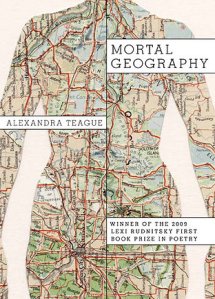Bird Bear
Poetry reviews, booze pairings, and occasional other stuff
Tag Archives: Alexandra Teague
Mortal Geography by Alexandra Teague (Paired w/ Gin Sling)
Review by Aaron Krol
Mortal Geography
Alexandra Teague
Persea Books, 2010
$15
88 pages
It’s amazing how regional American poetry can be. There’s every reason to think Alexandra Teague’s Mortal Geography should be in fairly regular circulation – it won both the Lexi Rudnitsky First Book Prize and the top poetry prize in the California Book Awards, which, I mean, it’s California, there must be some pretty stiff competition there – but here in Boston I managed to never hear about or run across it at all. But I took a trip to San Francisco recently where I saw it in a bookstore, and I read the first poem, “Adjectives of Order.”
So, yeah, for my fellow East Coasters who may be in the same boat as me – this is a book where to read the first poem is to buy it.
“Adjectives of Order” sets a great pattern that you’ll see recur throughout the book. A lot of poets like to sneak meditations about language into poems that seem to be about something else entirely (well, we would, we’re a pretty language-focused bunch). Three-quarters of the way through a poem like this, you’re supposed to go, “Oh, she’s been talking about language the whole time.” We can be pretty pleased with ourselves when we do that.
Teague likes to do the opposite. This particular poem starts,
That summer, she had a student who was obsessed
with the order of adjectives. A soldier in the South
Vietnamese army, he had been taken prisoner when
Saigon fell. He wanted to know why the order
could not be altered.
What follows is a whole bunch of interrogation of the way we string adjectives together. Why is it “warm homemade bread” and not “homemade warm bread”? Is there some inherent rationale behind the phrase “lovely big rectangular old red English Catholic leather Bible”? Would it be wrong to rearrange it?
You’ll probably have guessed already that the poem is ultimately more interested in the student’s experience as a prisoner of war in Vietnam. I won’t spoil the ending, except to say that the two halves of the poem come together with all the satisfaction of a snap fastener. What I will say is that Teague has realized that her questions about language are interesting enough that she doesn’t have to shuffle them into the poem in disguise. Of course I want to know about the student, but I also want to know what the logic is behind the order of adjectives. It’s something I had never thought about before, never even realized there were unspoken rules about. But “homemade warm bread” sounds wrong, and now I want to know the rules. Language is mysterious.
Teague keeps coming back to that well – most memorably, to me, in “Explanation to a Student,” about navigating Elizabethan diction, and in “Performative Language” – but let me convince the readers who aren’t swooning over the idea of reading about language all the time that Mortal Geography is still a book you want to read. Is it enough to add that Teague writes lines like “In the beginning was snow, fluffy and colored / like cabbage,” or “her heart / sprouts like a brash corsage”? Or, in a blunter mood in “Arkansas Churches”:
As the atheists’ daughter, I had an open invitation to be lost
at ten different churches. Heaven was offered once each year
like pastel dresses for Easter, but Hell was ongoing.
No, I think what you really need to know is that her obvious love of what language can do spills into everything, no matter what her subject. She relishes in the twistier forms – you’ll find both a pantoum and a sestina here – and will gladly invent her own, including in one absolutely wild poem called “Two Drafts Written After a Fight” whose second half utterly transforms the first by changing nothing but the punctuation. I still can’t decide, after four or five readings, whether that poem is a work of original genius or too clever by half, and honestly I lean toward the latter. But then, how often does a poem pull off either?
Does this all sound a little ivory tower, or at least, a bit like she’s writing to impress more than to connect? Listen – this book contains “Choose-Your-Own-Adventure Poem,” which is, yes, just what it sounds like. It includes “From The Spell Tables,” which milks a Dungeons & Dragons rulebook for emotion you’d never imagine was hiding there. It’s not interested in language like a grad student is interested in her thesis topic, it’s fixated on language like a six-year-old with a new set of Legos.
There are fascinating things going on with language everywhere, and this book is for everyone.
* * *
Gin Sling
This is definitely a gin book – the emotion eases in, not jolting you out of your seat but settling over you like a bath, and you’ll want something dry and crisp to glide through it with. I’ve chosen a Sling for its easy flavors that let you just enjoy it as a refreshment if you like, or really relish in the tang of the gin if that’s your style.
2 oz. gin
1/2 oz. Cointreau (or, seriously, any orange liqueur is fine)
1/2 oz. lemon juice
chilled club soda to taste
Shake the gin, Cointreau and lemon juice together and strain into a highball glass. Top with club soda – I like just enough to feel the fizz, but in a classic Sling it will be half the glass or more – and stir gently. If you’re using fresh lemon juice (because you’re one of the good guys!), you can drop a lemon wedge in. A Sling calls for a more citrusy gin; New Amsterdam is a good price and will do nicely.
